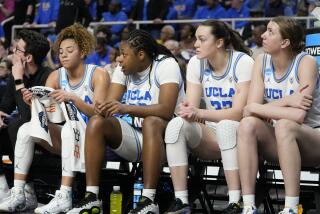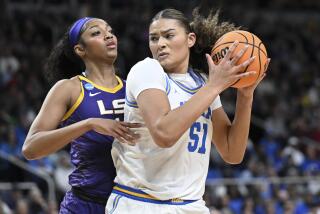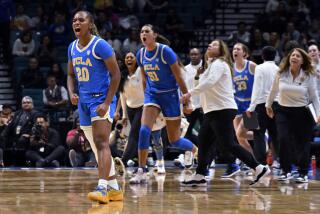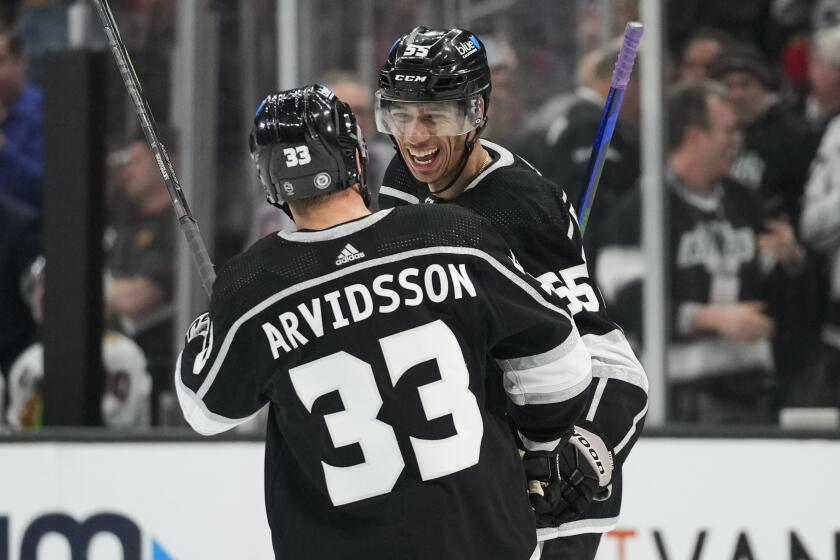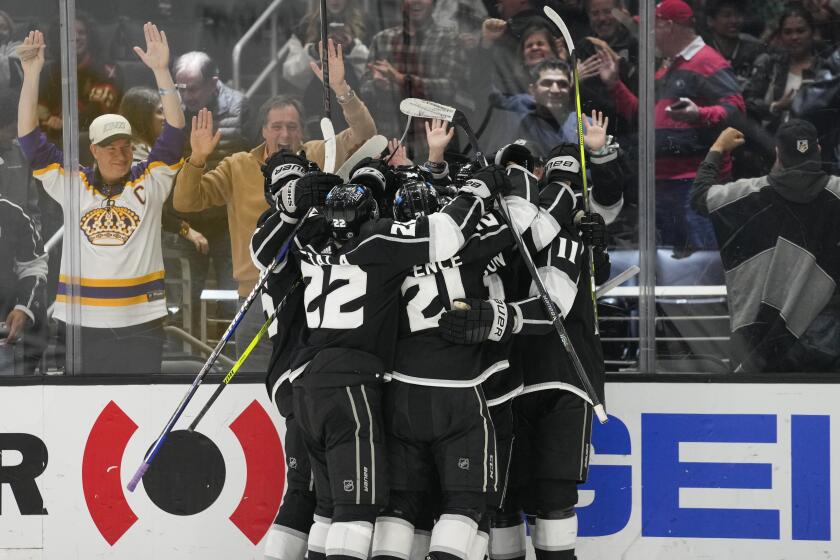Kennedy Burke’s drive to be great is finally an asset for the UCLA women’s basketball team
UCLA senior guard Kennedy Burke couldn’t help it — the word just popped out, twice. “Sorry,” she said after realizing her bounce pass to freshman guard Kayla Owens landed a little behind her, putting Owens off balance as she attempted a layup at a November practice.
“Tell her sorry after the play,” coach Cori Close said.
Last season, Burke was the Bruins’ third-leading scorer behind Jordin Canada and Monique Billings. This season, with Canada and Billings in the WNBA, it was up to Burke to lead the team. She had the talent to fill the role, Close said, but faced a mental obstacle — keeping her perfectionism from impeding her performance.
“There’s a part of it that’s really a strong part about her; she’s got a really strong will … she really wants to be great, she really wants to do something for her teammates,” Close said. “But if you’re afraid to disappoint and you are paralyzed by mistakes … it becomes a weakness.”
This season, she has overcome that obstacle and many more, posting career highs in points (14.2), rebounds (5.8) and assists (2.8) per game for the Bruins, who play USC on Sunday at Pauley Pavilion.
Last month, Burke became the fourth player in UCLA history with more than 1,000 points, 500 rebounds and 100 blocks.
“Her potential is endless,” Close said. “And I honestly think she’s just now starting to scratch the surface of how good she’s gonna be.”
Burke’s 6-foot-1 frame, precise shooting and aggressive defense allow her to play almost any position on the court.
Close calls her “a stat-stuffing fool” for her talent, which has drawn attention since high school, when Burke led Chatsworth Sierra Canyon High to win three straight Southern Section championships, earning Southern Section player-of-the-year honors in 2013. As a rising senior, she won a gold medal playing for USA Basketball’s Women’s Under-17 World Championship team in the Czech Republic.
“I thought she was one of the most talented players I had really ever seen,” said Alicia Komaki, Burke’s high school coach.
When Burke cried in Close’s office watching a video of players giving out shoes and socks at a local school, Close knew she belonged at UCLA. Burke was drawn to the school for its environment and coaching staff, and its proximity to her Northridge home.
Sign up for our daily sports newsletter »
At first, Burke frequently slipped home when the team had a day off, or grabbed dinner with her mom during the week. Close said she retreated to her family every chance she had as a freshman.
Struggling to perform under pressure, Burke ruminated about her mistakes instead of creating plays, fearing she would disappoint her team and her family. During film sessions with Close, Burke sometimes closed her eyes, dreading the sight of her errors on the screen.
“I think ever since I started playing basketball,” Burke said, “I’ve always been kind of hard on myself.”
It was during Burke’s junior season that things began to change, according to Canada, a member of the Seattle Storm. Canada and Close noticed Burke grow more confident, as she began to perform under pressure where she had frozen in the past. When the Bruins defeated Texas in the Sweet 16 of the NCAA tournament, Canada said Burke was the difference-maker, with her 15 points and five rebounds.
“She was like our silent assassin,” Canada said. “Not a lot of people scouted her, and she just took that and ran with it. … It’s just so hard to guard her, and I think she started to realize that, that when she’s at her best, there’s no one that can stop her.”
Once Canada and Billings graduated, Burke realized she needed to escalate her game.
“I have to step up if we want to be successful,” Burke said. “I have to step into the role of being that person that everyone can count on.”
She contacted trainer Olin Simplis to work with her in the offseason, starting with a 1 1/2-hour session in the spring with Burke and Notre Dame guard Marina Mabrey. Postseason rest left Burke out of shape, and under the strain of the drills she erred. Several times during the workout, she left the court.
As Mabrey did one final drill to end the workout — making 10 pull-up jumpers at the free-throw line and running 17 sideline-to-sideline timed sprints — Burke sat on the side with her head down. Then, Simplis walked to her and whispered in her ear.
“These are the moments where … players are made,” he said. “When no one’s looking, when you’re challenged, when things aren’t going well, you’re either going to hit the challenge, or you’re gonna let the challenge defeat you.”
He left her and led Mabrey through cool-down stretches when Burke rose and approached him.
“I want to do everything Marina just did,” Simplis remembers Burke saying, her eyes locked on her trainer.
He replied: “Are you sure?”
Burke completed every exercise, then called Simplis the next day to train again. Beyond the two-to-four times a week they worked out in the off-season, Burke trained on her own with renewed determination.
“When you see how passionate she is in the game … you want to come with her,” Bruins sophomore forward Lauryn Miller said.
She built her endurance and learned to motor past mistakes, only stopping to process them in discussions with Simplis and Close.
During workouts, she smiles.
“I’m so proud,” Close said. “When she comes into my office, I smile. I can see who she’s becoming.”
Now that Burke’s mentality has shifted, so has her game. Her team-leading 33.9 minutes per game this season mark the first time in her collegiate career she has averaged more than 30 minutes of playing time.
Close looks forward to their film sessions, and notices Burke enjoying practice more. Burke says she still has room to grow, leading a 9-8 UCLA team that has lost its last three games, all against top-10 teams.
But Burke is done letting her slip-ups hold her back.
“I know that they’re fixable, and it’s not permanent,” Burke said. “It’s just a learning process.”
More to Read
Get our high school sports newsletter
Prep Rally is devoted to the SoCal high school sports experience, bringing you scores, stories and a behind-the-scenes look at what makes prep sports so popular.
You may occasionally receive promotional content from the Los Angeles Times.
